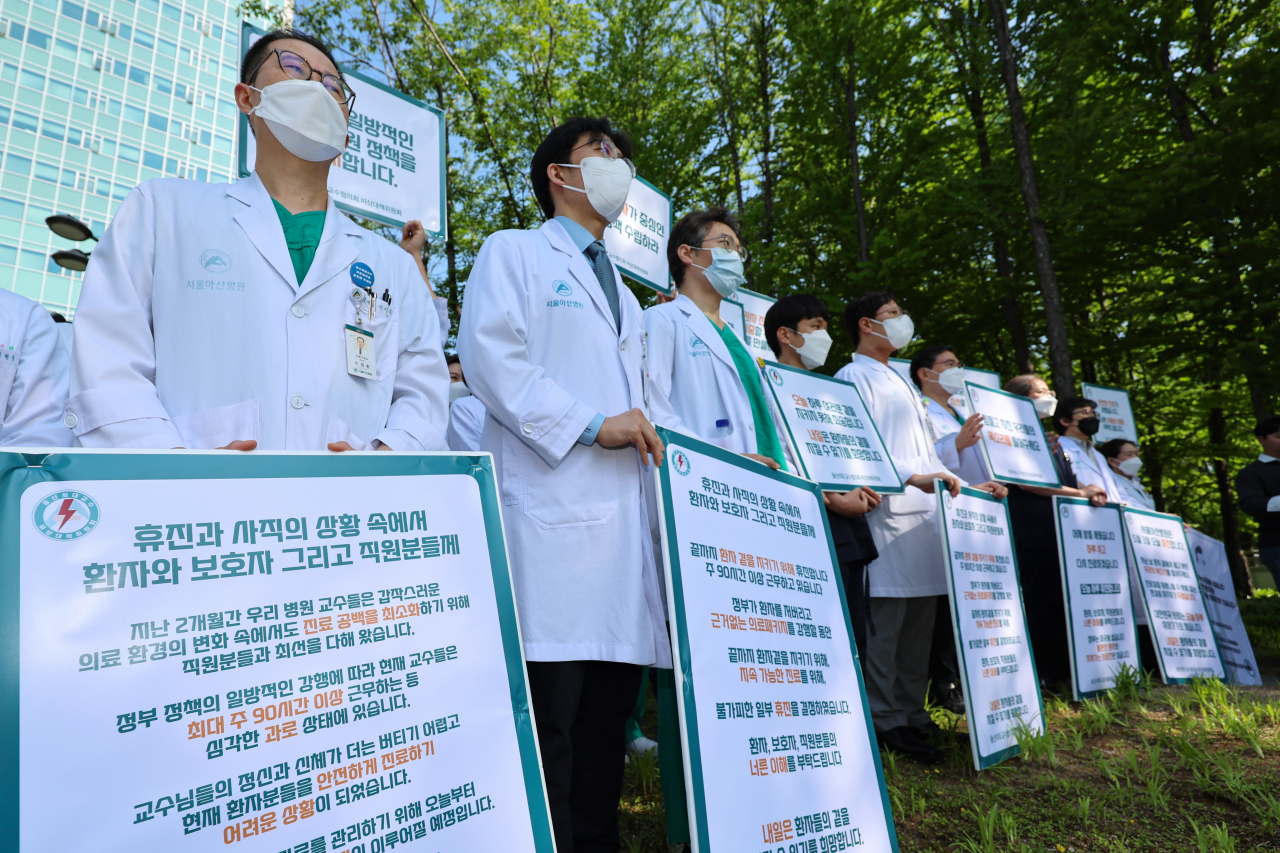 |
Medical professors at the Asan Medical Center in Songpa-gu, southern Seoul, stage a protest in front of the hospital on Friday to condemn the government’s decision to have more medical students starting next year. (Yonhap) |
More than 590 resident doctors who left their hospitals in protest of the government’s medical school quota expansion have returned, the Health Ministry said Friday, without providing the names of the hospitals, citing the possibility of future disadvantages from the medical circle.
Currently, a little more than 590 out of 9,900 resident doctors, or six percent of the total, have returned to their training hospitals as of Thursday, the ministry explained.
Second Vice Health Minister Park Min-soo told reporters that “a few junior doctors are returning to their patients’ sides” amid the protracted medical standoff, urging the unreturned to go back to hospitals swiftly.
The contract rate for doctors going through fellowship programs at 100 training hospitals stood at 65.8 percent as of Thursday, nearly a twofold increase from Feb. 29, according to data provided by the ministry.
Notably, the rate for the country’s “big five” hospitals -- Seoul National University Hospital, Severance Hospital, Samsung Medical Center, Asan Medical Center and Seoul St. Mary’s Hospital -- stood at 68.2 percent.
Although the reason for striking doctors’ return is unclear, some have been experiencing difficulties in making a living and have been unable to find employment at other medical institutions, as their resignations have remained technically on hold, according to reports.
Last month, Jun Byung-wang, a police chief at the Health Ministry, said in a briefing that they could not seek another job because the government’s return to work order remains in effect.
Despite the government’s report of doctors returning, some medical professors at two major hospitals suspended surgeries and outpatient clinics on Friday.
The professors at the University of Ulsan College of Medicine and the Catholic University of Korea, who double as senior doctors at Asan Medical Center and Seoul St. Mary’s Hospital, respectively, took a day off due to fatigue stemming from months of filling in the medical vacuum caused by junior doctors’ walkout against the expansion plan, which entered its 11th week.
However, emergency rooms and treatments for hospitalized and severely ill patients remained in operation.
In the early morning, some 50 medical professors at Asan Medical Center clad in white gowns staged a protest in front of the hospital to condemn the government’s unilateral decision to increase the medical school enrollment quota. Later, they held a closed-door seminar on the medical crisis.
Medical professors at Seoul St. Mary’s Hospital, another major hospital, started suspending noncritical surgical services every Friday beginning on this day to recover from exhaustion, according to the hospital’s emergency committee of professors.
Turning their frustration over the quota hike into action, medical professors at Chungbuk National University Hospital, Daejeon St. Mary’s Hospital and Konyang University Hospital halted outpatient treatment on Friday as well. The hospitals said the decisions were made individually by professors, adding that there would be no disruption in health care services. They also said no outpatient treatments were scheduled for the day.
Medical professors at Incheon St. Mary’s Hospital will temporarily suspend treatment for outpatients on Saturdays starting this week.
Despite concerns about the planned action, the impact of the one-day strike was not being felt among patients, according to health authorities. No medical professors were gone for good, they added.
“The professors’ council recommended taking a day off, but they have not made any announcement regarding suspending treatments. The hospital is offering medical services at its maximum capacity,” a senior official at Seoul St. Mary’s Hospital told The Korea Herald.
An official at Asan Medical Center told The Korea Herald that the number of treatments at the hospital “hasn’t significantly decreased” compared to April 26, adding that the hospital was experiencing little disruption to patient care.
Earlier this week, some senior doctors at Severance Hospital, who work as medical professors at Yonsei University, and professors at the Seoul National University Hospital also suspended surgeries and treatment for outpatients for a day.
Meanwhile, some 485 medical students filed an appeal Thursday against the Seoul Central District Court’s decision to reject the injunction they sought against the presidents of their universities for increasing admission quotas, Lee Byeong-cheol, their legal representative, said Friday.






![[Today’s K-pop] Blackpink’s Jennie, Lisa invited to Coachella as solo acts](http://res.heraldm.com/phpwas/restmb_idxmake.php?idx=644&simg=/content/image/2024/11/21/20241121050099_0.jpg)
